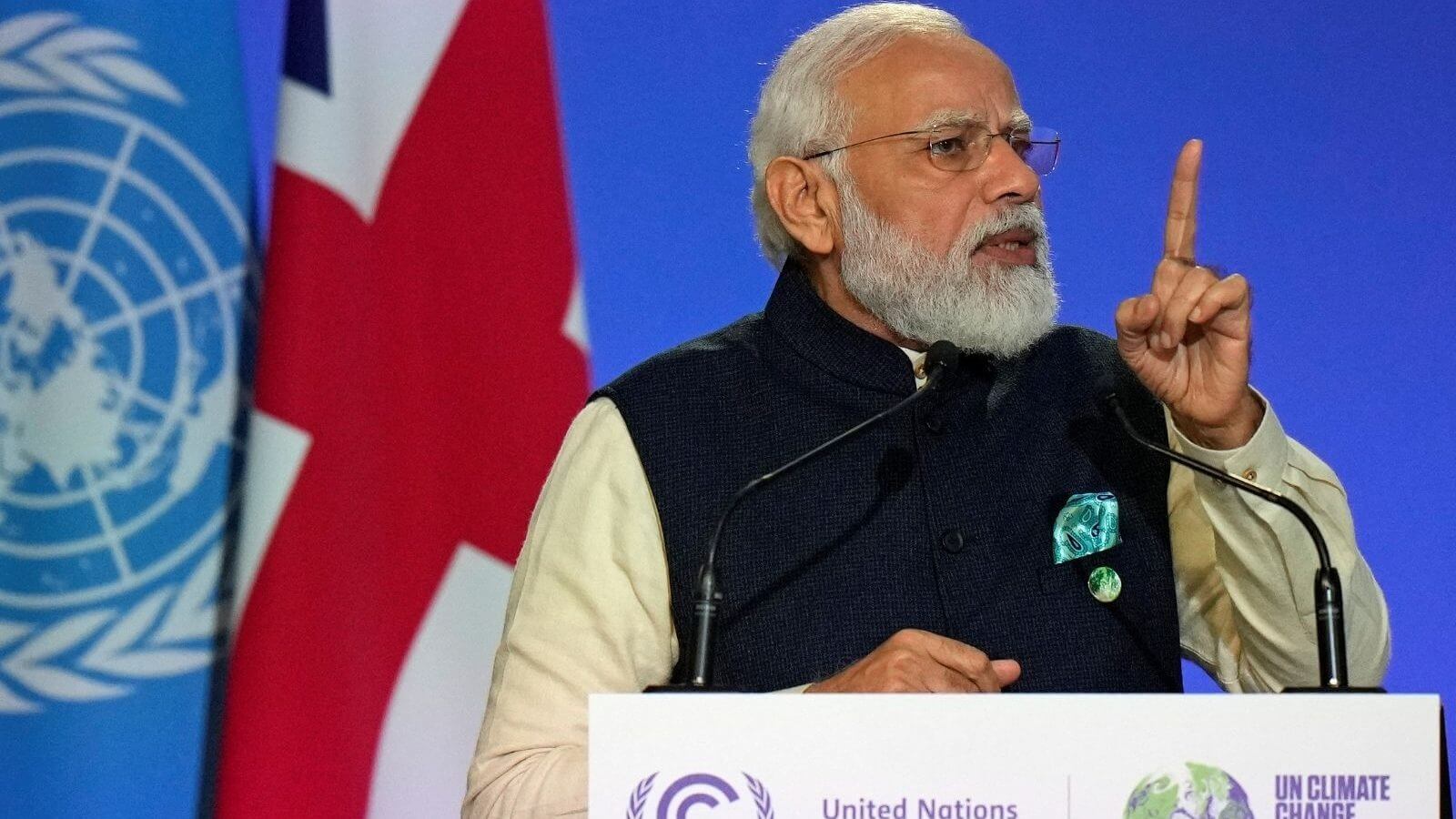On Monday, Indian Prime Minister (PM) Narendra Modi delivered the “National Statement” at the beginning of the 26th Conference of Parties (COP26) to the United Nations Framework Convention on Climate Change (UNFCCC) in Glasgow. The meeting sees the participation of over 200 countries and has been convened with the aim of establishing international mechanisms and targets for climate action.
To begin with, the PM spoke of the Paris Climate Summit, which he applauded as a positive “sentiment” and a “commitment” for the international community. He then highlighted that despite India being a developing country and home to 17% of the world’s population, it is responsible for merely 5% of global emissions. Modi said that this was indicative of India’s commitment to the Paris Agreement. Celebrating India’s achievements, he added, “Today the whole world believes that India is the only big economy, which has delivered in letter and spirit on the Paris Commitment. We are making every effort with determination, working hard, and showing results.”
Also Read: Ahead of COP26, We Must Ask: Is India Genuinely Committed to Climate Action?
Modi then highlighted India’s plans to strengthen its dedication to climate action. He spoke of the Indian railway system’s plan to make itself net-zero by 2030. He said, “This initiative alone will lead to a reduction of 60 million tonnes of emissions annually.” He also touched on India’s campaign to promote the use of LED bulbs, which will effectively cut down 40 million tonnes of emissions each year. He further highlighted the role played by India in initiating the International Solar Alliance (ISA) and the Coalition for Disaster Resilient Infrastructure (CDRI).
The Indian leader urged the international community to adopt the “Lifestyle For Environment” campaign, which he said requires a “mass movement” towards an “environmentally conscious lifestyle.” He recommended the substitution of “mindless and destructive consumption” with “mindful and deliberate” practices, noting that this could play an instrumental role in revolutionising the fishing, agriculture, housing, hospitality, and energy industries.
In furtherance of his call for a global commitment to climate action, Modi presented five “nectar elements,” which he called Panchamrit, for India to deal with the challenges posed by climate change. Firstly, he vowed to expand India’s non-fossil energy capacity to 500 GW by 2030. Secondly, he said that by 2030, half of India’s energy needs would be met by renewable sources of energy. Thirdly, he pledged to reduce the total projected carbon emissions by one billion tonnes by 2030. Fourthly, he vowed to reduce the carbon intensity of the Indian economy to less than 45%. Finally, he declared that by 2070, India will achieve carbon neutrality.
However, he highlighted that there needs to be a reform to climate financing from the Paris Agreement, which has resulted in largely “hollow” promises. He spoke of the need for the “transfer of climate finance and low-cost climate technologies” and thus called on developed countries to pledge $1 trillion towards financing climate action.
Concluding his address, Modi highlighted the impact of climate change felt by developing countries, for whom climate change has caused an existential crisis. Hence, he urged the leaders to take unified action to save future generations by solidifying their commitment to climate action.
On the same day, Modi also addressed an event on “Action and Solidarity – The Critical Decade” at the COP26 Summit. During this speech, he focussed on the importance of “adaptation,” which he said is not given as much importance in the global debate on climate change. He highlighted the challenges posed by climate change and its impact on agricultural activities and accessibility to water and housing.
To address these challenges from the lens of “adaptation”, he presented three views. He said that, to begin with, adaptation needs to be made a critical part of policies and projects, citing examples Indian campaigns such as the Nal se Jal or the “Tap water for all” project and the Swachh Bharat or the Clean India Mission. He also spoke of the Ujjwala campaign, through which the Modi government seeks to provide clean cooking fuel to all Indians. He claimed that such policies improved the quality of life of the citizens.
Secondly, the PM said that adaptation policies must also give importance to traditional practices, which often promote harmonious living with nature. He added that this would advance the “preservation of lifestyles” in accordance with “local conditions.” Lastly, he said that while the policies and methods of such adaptation must be encouraged locally, developing and underdeveloped countries should receive global support for them.
Read the transcript of the National Statement and the ‘Action and Solidarity-The Critical Decade’ address here and here.

